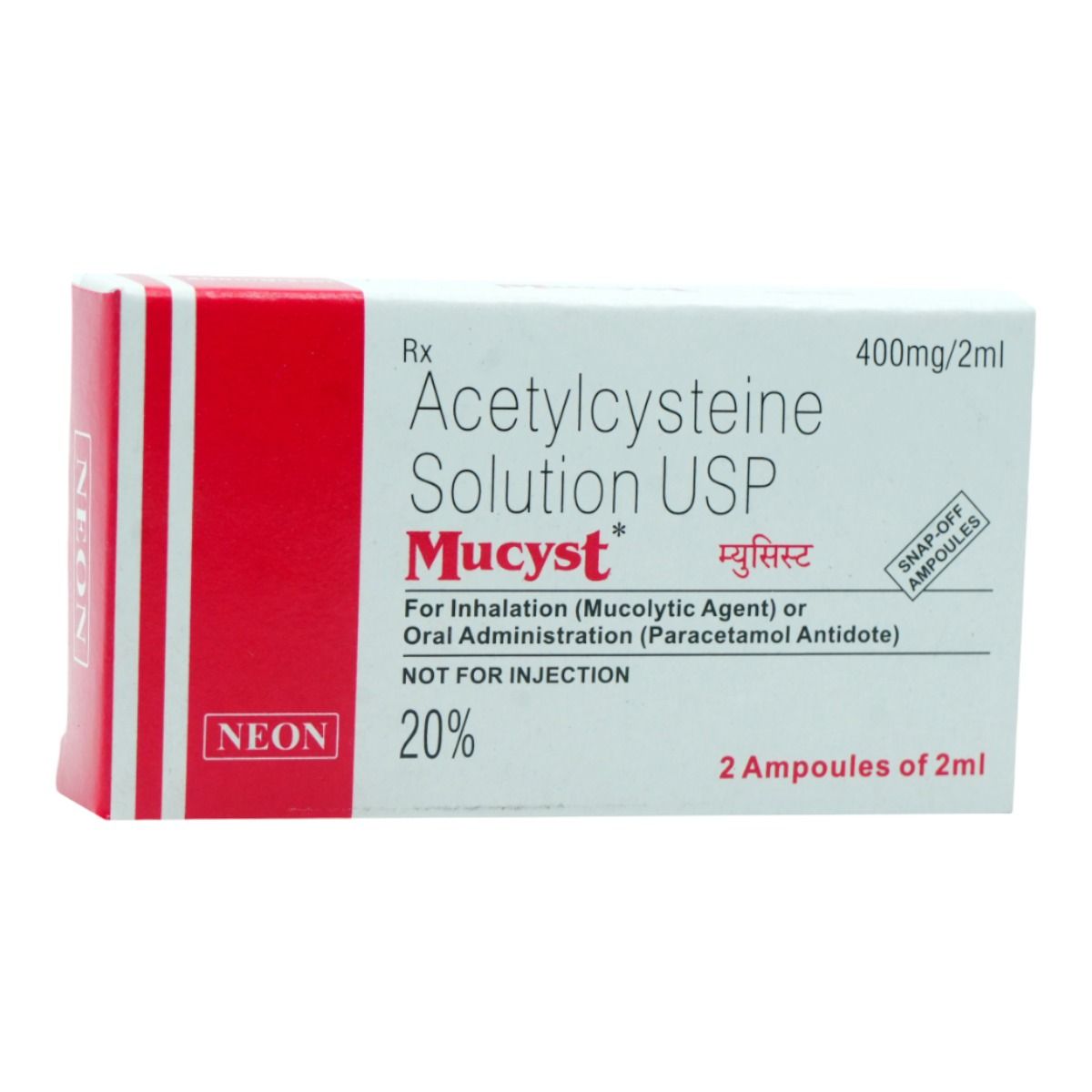Acetylcysteine
About Acetylcysteine
Acetylcysteine is used to treat Paracetamol (acetaminophen) overdose and prevent liver injury. Paracetamol overdose may occur when the person takes more than 8 Paracetamol tablets in 24 hours accidentally or when intended to cause self-harm. If it is not treated promptly with an antidote, a significant overdose can lead to liver failure.
Acetylcysteine contains Acetylcysteine, which works by restoring the levels of glutathione, a chemical that eliminates toxic substances.
Acetylcysteine will be administered by a healthcare professional; do not self-administer. Some people may experience inflammation and pain at the injection site, nausea, vomiting, fever, excessive shivering, sweating, bruising, or bleeding more easily than normal. Most of these side effects of Acetylcysteine do not require medical attention and gradually resolve over time. However, if the side effects persist or worsen, please consult your doctor.
If you are allergic to Acetylcysteine or any other medicines, please tell your doctor. Acetylcysteine is given to children in doses advised by a doctor based on the child’s age and weight. If you are pregnant or breastfeeding, please inform your doctor before taking Acetylcysteine. If you are about to undergo any surgery, inform the anaesthetist or surgeon that you are being treated with Acetylcysteine.
Uses of Acetylcysteine
Medicinal Benefits
Acetylcysteine is an antidote for Paracetamol (acetaminophen) overdose. It works by restoring the body’s glutathione, a chemical that eliminates toxic substances. Also, it protects the liver from damage caused due to high levels of paracetamol. Acetylcysteine is very effective when given within 10 hours of paracetamol overdose.
Directions for Use
Storage
Side Effects of Acetylcysteine
- Inflammation and pain at the injection site
- Nausea
- Vomiting
- Fever
- Excessive shivering
- Sweating
- Bruising or bleeding more easily than normal
Drug Warnings
If you are allergic to Acetylcysteine or any other medicines, please tell your doctor. Acetylcysteine is given to children in doses advised by a doctor based on the child’s age and weight. If you are pregnant or breastfeeding, please inform your doctor before taking Acetylcysteine. If you are about to undergo any surgery, inform the anaesthetist or surgeon/dentist that you are being treated with Acetylcysteine. If you have a history of stomach ulcers or have asthma, inform your doctor before taking Acetylcysteine.
Drug Interactions
Drug-Drug Interaction: Inform your doctor if you are taking any other medicines obtained with or without prescription, including herbal medicines.
Drug-Food Interaction: No interactions were found.
Drug-Disease Interaction: If you have a history of stomach ulcers or have asthma/ difficulty breathing, kidney or liver problems, inform your doctor before taking Acetylcysteine.
Drug-Drug Interactions Checker List:
Safety Advice

Alcohol
cautionInteraction of alcohol with Acetylcysteine is unknown. Please consult a doctor before consuming alcohol with Acetylcysteine.

Pregnancy
cautionAcetylcysteine is given to pregnant women only if the doctor thinks the benefits outweigh the risks.

Breast Feeding
cautionAcetylcysteine is given to breastfeeding mothers only if the doctor thinks the benefits are greater than the risks.

Driving
safe if prescribedAcetylcysteine usually does not affect your ability to drive or operate machinery.

Liver
cautionAcetylcysteine should be used with caution if you have a history of Liver diseases/conditions. Your doctor will decide to administer Acetylcysteine if the benefits are greater than the risks.

Kidney
cautionAcetylcysteine should be used with caution if you have a history of Kidney diseases/conditions. Your doctor will decide to administer Acetylcysteine if the benefits are greater than the risks.

Children
cautionAcetylcysteine is given to children in doses advised by a doctor based on child’s age and weight.
Habit Forming
Diet & Lifestyle Advise
- Do not take more than the Paracetamol dose mentioned on the label or prescribed by the doctor.
- Avoid giving Paracetamol to your child unless it is necessary for their fever or pain.
- For children below 2 years, use Paracetamol only in the dose advised by the doctor based on the child’s body weight.
- Limit or avoid alcohol consumption.
Special Advise
Acetylcysteine may give a false positive result with reagent dipstick tests for urinary ketones. Therefore, inform the lab technician that you are taking Acetylcysteine before undergoing any laboratory tests.
Patients Concern
Disease/Condition Glossary
Paracetamol overdose: It may occur when the person takes more than 8 Paracetamol tablets in 24 hours accidentally or when intended to cause self-harm. If it is not treated promptly with an antidote, significant overdose can lead to liver failure. The symptoms of Paracetamol overdose include vomiting and nausea after a few hours of taking an overdose, and after 24 hours, there may be jaundice (yellowing of the whites of skin and eyes) and pain under the ribs on the right side. Also, it may cause hypoglycemia (low blood sugar) and loss of appetite.
FAQs
Acetylcysteine is used to treat Paracetamol (acetaminophen) overdose and prevent liver injury.
Acetylcysteine works by restoring the body’s glutathione, a chemical that eliminates toxic substances. Thus, it helps in the treatment of Paracetamol overdose.
You are recommended to inform your doctor or dentist that you have been treated with Acetylcysteine if you are due to undergo any surgery or dental procedure because it may alter the effects of certain medicines that are used during anaesthesia.
Acetylcysteine may interfere with reagent dipstick tests for urinary ketones giving false positive results. Therefore, if you are about to undergo any laboratory tests, inform your doctor or lab technician that you are taking Acetylcysteine.
Acetylcysteine may cause allergic reactions in some people. It is not necessary for everyone taking Acetylcysteine to have allergic reactions. However, if you notice a skin rash, itching, flushing, difficulty breathing or swelling of the face, inform your doctor immediately.







